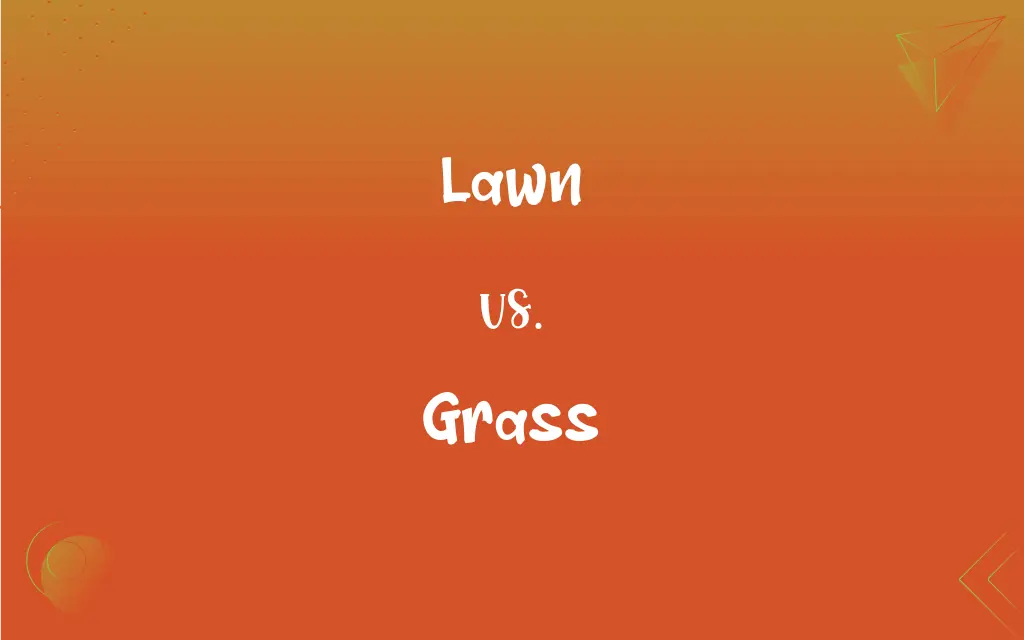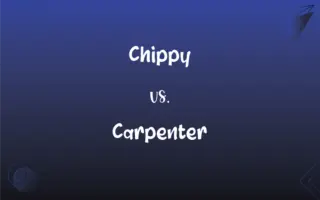Lawn vs. Grass: What's the Difference?
Edited by Harlon Moss || By Janet White || Updated on October 3, 2023
Grass is a type of green plant, while Lawn is an area of cultivated, mowed grass.

Key Differences
Lawn, when spoken of, often conjures images of neatly manicured and methodically maintained areas of grass, usually in a garden, park, or yard. It indicates more than just the plant matter, but an entire landscape element which is created and managed for aesthetics, play, or other functions. Grass, conversely, refers to any of the numerous plants with narrow leaves that commonly occupy lawns but can also be found in meadows, fields, and pastures, unfettered by the nuances of human design and intention.
Within specific contexts, Lawn typically directs us towards domesticity and human intent. A lawn is grass but shaped, formed, and regularly maintained by human hands for specific purposes such as decoration or recreation. Grass, meanwhile, casts a wider net, embodying both the wild grasses that traverse extensive plains and the domesticated versions that families meticulously mow on the weekend. The former doesn’t imply management, it simply is, whether under the open sky or neatly contained within a backyard.
From a botanical standpoint, Grass encapsulates a family of plants (Gramineae or Poaceae) that share common characteristics, such as slender leaves and jointed stems. Grass can be wild, cultivated, ornamental, or functional, adapting to various ecosystems and purposes without human intervention. Lawn, although composed of grass, attains its identity through human intervention, cultivation, and maintenance, establishing a system where the natural is rendered orderly.
In practical terms, one might encounter Grass in various conditions, lengths, and environments, from wild prairies to quiet, unattended corners of a park. Grass doesn’t necessitate human involvement to establish its presence in an ecosystem. On the other side, Lawn implies an inherent requirement for human involvement - to sow, to mow, and to maintain a specific aesthetic and structural integrity that differentiates it from a mere gathering of grass plants.
Arguably, when one observes a Lawn, they see not only the grass but also the labor and design imposed upon it. It is a space as much defined by its biological components (the grass) as its intended function (recreational, aesthetic). Whereas Grass, in its various forms, speaks to an unrestricted, unstructured existence, free to grow wherever conditions permit – a field, a meadow, or indeed, a lawn.
ADVERTISEMENT
Comparison Chart
Grammatical Type
Used as a noun.
Can be used as a noun and occasionally as a verb.
Implied Action
Implies cultivation and maintenance.
Does not necessarily imply management.
Usage in Context
Indicates a managed area.
Refers to a type of plant, managed or not.
Temporal Aspect
Implies ongoing maintenance.
Can grow wild without interference.
Specificity
Specific, denoting managed grassy areas.
General, can refer to any similar plant.
ADVERTISEMENT
Lawn and Grass Definitions
Lawn
Grass that has been mown and maintained.
The lawn is freshly cut.
Grass
A green plant with jointed stems and long slender leaves.
The grass waved in the breeze.
Lawn
An area of short, mown grass in a yard or park.
The kids are playing on the lawn.
Grass
Ground covered with such plants.
The grass in the meadow is tall.
Lawn
A ground cover of uniform height.
The lawn was a vibrant green canvas.
Grass
Plants from the Gramineae family.
Different types of grass thrive in varied climates.
Lawn
An area designated for recreational activities.
We’ll have the picnic on the lawn.
Grass
A member of the grass family.
Lawn
A plot of grass, usually tended or mowed, as one around a residence or in a park.
Grass
The members of the grass family considered as a group.
Lawn
A light, finely woven, cotton or linen fabric.
Grass
Any of various plants having slender leaves similar to those of a grass.
Lawn
An open space between woods.
Grass
Ground, as on a lawn, that is covered with grass or similar plants.
Lawn
Ground (generally in front of or around a house) covered with grass kept closely mown.
Grass
Grazing land; pasture.
Lawn
(biology) An overgrown agar culture, such that no separation between single colonies exists.
Grass
(Slang) Marijuana.
Lawn
(uncountable) A type of thin linen or cotton.
Grass
(Electronics) Small variations in amplitude of an oscilloscope display caused by electrical noise.
Lawn
(in the plural) Pieces of this fabric, especially as used for the sleeves of a bishop.
Grass
Chiefly British Slang An informer.
Lawn
A piece of clothing made from lawn.
Grass
To cover with grass.
Lawn
An open space between woods.
"Orchard lawns and bowery hollows."
Grass
To grow grass on.
Lawn
Ground (generally in front of or around a house) covered with grass kept closely mown.
Grass
To feed (livestock) with grass.
Lawn
A very fine linen (or sometimes cotton) fabric with a rather open texture. Lawn is used for the sleeves of a bishop's official dress in the English Church, and, figuratively, stands for the office itself.
A saint in crape is twice a saint in lawn.
Grass
To become covered with grass.
Lawn
A field of cultivated and mowed grass
Grass
To graze.
Lawn
A stretch of grassy land forming a lawn.
The lawn spread lushly before the house.
Grass
Any plant of the family Poaceae, characterized by leaves that arise from nodes in the stem and leaf bases that wrap around the stem, especially those grown as ground cover rather than for grain.
Grass
(countable) Various plants not in family Poaceae that resemble grasses.
Grass
(uncountable) A lawn.
Grass
Marijuana.
Grass
An informer, police informer; one who betrays a group (of criminals, etc) to the authorities.
What just happened must remain secret. Don't be a grass.
Grass
Sharp, closely spaced discontinuities in the trace of a cathode-ray tube, produced by random interference.
Grass
Noise on an A-scope or similar type of radar display.
Grass
The season of fresh grass; spring or summer.
Grass
That which is transitory.
Grass
Asparagus; "sparrowgrass".
Grass
(mining) The surface of a mine.
Grass
(transitive) To lay out on the grass; to knock down (an opponent etc.).
Grass
To act as a grass or informer, to betray; to report on (criminals etc) to the authorities.
Thesaurus:rat out
Grass
(transitive) To cover with grass or with turf.
Grass
(transitive) To feed with grass.
Grass
(transitive) To expose, as flax, on the grass for bleaching, etc.
Grass
(transitive) To bring to the grass or ground; to land.
Grass
Popularly: Herbage; the plants which constitute the food of cattle and other beasts; pasture.
Grass
An endogenous plant having simple leaves, a stem generally jointed and tubular, the husks or glumes in pairs, and the seed single.
Grass
The season of fresh grass; spring.
Two years old next grass.
Grass
Metaphorically used for what is transitory.
Surely the people is grass.
Grass
Marijuana.
Grass
To cover with grass or with turf.
Grass
To expose, as flax, on the grass for bleaching, etc.
Grass
To bring to the grass or ground; to land; as, to grass a fish.
Grass
To produce grass.
Grass
Narrow-leaved green herbage: grown as lawns; used as pasture for grazing animals; cut and dried as hay
Grass
German writer of novels and poetry and plays (born 1927)
Grass
Animal food for browsing or grazing
Grass
Street names for marijuana
Grass
Shoot down, of birds
Grass
Cover with grass;
The owners decided to grass their property
Grass
Spread out clothes on the grass to let it dry and bleach
Grass
Cover with grass
Grass
Feed with grass
Grass
Give away information about somebody;
He told on his classmate who had cheated on the exam
Grass
A surface covered with unattended plants.
The grass grew wild in the field.
Grass
Used to describe lawns and fields.
The grass needs cutting in the backyard.
FAQs
Does a lawn only consist of grass?
Mostly, but it may have other elements like flowers.
Can a lawn exist in the wild?
No, lawns are cultivated and do not exist naturally.
Can grass be ornamental?
Yes, some grass varieties are used for ornamental purposes.
Is grass always green?
Mostly, but it can turn yellow/brown if not well-maintained or in drought.
Is grass a living organism?
Yes, grass is a living plant.
How often should a lawn be watered?
It varies, usually, 1-1.5 inches of water per week.
Is a lawn always manicured?
Typically, a lawn is maintained, but it can be neglected.
Do all lawns need mowing?
Generally, yes, to maintain a neat appearance.
Is grass edible?
Some grasses, like wheatgrass, are edible, but not all.
Can grass grow indoors?
Yes, with proper sunlight and care, grass can grow indoors.
Can grass survive without water?
It can resist drought but needs water to stay healthy.
Can a lawn be synthetic?
Yes, synthetic lawns made of artificial grass exist.
How to get a healthy lawn?
Regular mowing, watering, and fertilizing help maintain a lawn.
Does grass provide oxygen?
Yes, like other plants, grass performs photosynthesis.
Is maintaining a lawn expensive?
It can be, depending on size and maintenance level.
Why is lawn maintenance important?
It promotes growth, prevents pests, and enhances appearance.
Can grass survive in extreme heat?
Some types can, but most prefer moderate temperatures.
Can grass grow in winter?
Some grass types can, but growth generally slows in cold weather.
How to identify types of grass?
Through characteristics like leaf shape, size, and growth pattern.
Can a lawn be made of plants other than grass?
Rarely, other groundcovers might be used.
About Author
Written by
Janet WhiteJanet White has been an esteemed writer and blogger for Difference Wiki. Holding a Master's degree in Science and Medical Journalism from the prestigious Boston University, she has consistently demonstrated her expertise and passion for her field. When she's not immersed in her work, Janet relishes her time exercising, delving into a good book, and cherishing moments with friends and family.
Edited by
Harlon MossHarlon is a seasoned quality moderator and accomplished content writer for Difference Wiki. An alumnus of the prestigious University of California, he earned his degree in Computer Science. Leveraging his academic background, Harlon brings a meticulous and informed perspective to his work, ensuring content accuracy and excellence.































































